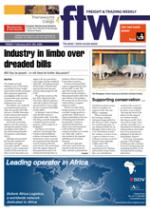The freight and trade
industry is now in that limbo
period after its heavyweight
representative bodies presented
their arguments against the
promulgation of the two new
customs bills to the standing
committee on finance in
parliament last week.
The industry now awaits the
next step from government –
either the passing of the bills
into law, or further discussion
on the controversial contents,
with a special focus on the
Customs Control Bill.
And it’s the second that
appears to be the consensus
amongst the industry bodies,
according to Pat Corbin of
the Johannesburg Chamber
of Commerce and Industry
(JCCI).
Although not necessarily
the favourite with the SA
Association of Freight
Forwarders (Saaff) – which is
trying to reach a compromise
with the SA Revenue Service
(Sars) on how forwarders can
adapt to the new procedures
and comply with the conditions
of the bill – the feeling amongst
all the bodies is that the time
span for discussion has just
not been long enough, he told
FTW.
The primary concern is the
loss of the inland ports like
City Deep, which has played a
vital role in effective SA trade
movement for 37 years, under
the new Customs Control Bill,
Corbin added.
As Business Unity SA (Busa)
said, this bill results in a
radical policy shift. “Ports like
City Deep, currently designated
as inland ports for customs
purposes, will no longer be so
designated.”
And Busa is not content
with Sars’ reasoning for this.
It believes that insufficient
evidence of customs fraud at
inland ports exists to warrant
the requirement that all goods
must be cleared at the first
point of entry. This particularly
given the negative impact of
this proposal not only on SA
inland ports but also those in
Southern African Customs
Union (Sacu) countries.
“Customs fraud and illicit
trade are apparently the basis
for this shift,” it said. “We
agree this scourge must be
addressed, but do not believe
that proposed policy shift is the
only solution to the problem.
We cannot risk an intervention
which will have a negative
impact on trade.”
And the new bill will hit
foreign exporters to SA who
currently consign goods to a
specific port, which may be
inland, particularly in the case
of Gauteng and overborderbound
goods. “Goods are
transferred directly from
ship to train and transported
to the inland port where
customs procedures are carried
out,” Busa said, “with no
intervention by the importer
until that port of customs
clearance.
But the new approach
will require intervention by
importer at the first port of
entry. And this is primarily the
Port of Durban for the bulk
of SA imports, and it will be a
move which is likely to lead to
further drastic congestion at
the port – and has led to fears
that congestion surcharges by
the lines could be the result.
Corbin agreed, and pointed
out that Sars was indeed
moving contrary to the global
trend on inland ports.
Busa is adamant that the
provisions of Section 18 of the
current Customs and Excise
Act – allowing for carriers
to deliver containers to an
inland destination – should
be retained.
It also recommended that
the new act should make
provision for a definition of
an inland port as a recognised
place of entry or exit.
Busa also believes that
the risks of the radical policy
shift of no longer allowing
customs clearance at inland
ports are so high that further
efforts should be made to
understand the implications
before proceeding with the
bill – and urged the finance
committee not to approve
the bill unless this matter is
addressed.
Industry in limbo over dreaded bills
07 Feb 2014 - by Alan Peat
0 Comments
FTW - 7 Feb 14

07 Feb 2014
07 Feb 2014
07 Feb 2014
07 Feb 2014
07 Feb 2014
07 Feb 2014
07 Feb 2014
07 Feb 2014
07 Feb 2014
07 Feb 2014
07 Feb 2014
07 Feb 2014
Border Beat
Featured Jobs
New
